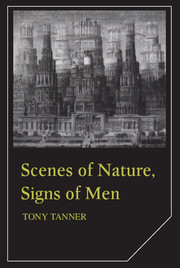Book contents
- Frontmatter
- Contents
- Preface
- 1 Scenes of nature, signs of men
- 2 Notes for a comparison between American and European Romanticism
- 3 Problems and roles of the American artist as portrayed by the American novelist
- 4 James on Hawthorne
- 5 The lost America – the despair of Henry Adams and Mark Twain
- 6 Henry James and Henry Adams
- 7 William Dean Howells and A Hazard of New Fortunes
- 8 Stephen Crane
- 9 The Bostonians and the human voice
- 10 Games American writers play: ceremony, complicity, contestation, and carnival
- 11 Toward an ultimate topography: the work of Joseph McElroy
- 12 Frames and sentences
- 13 William Gass's barns and bees
- Index
11 - Toward an ultimate topography: the work of Joseph McElroy
Published online by Cambridge University Press: 01 June 2011
- Frontmatter
- Contents
- Preface
- 1 Scenes of nature, signs of men
- 2 Notes for a comparison between American and European Romanticism
- 3 Problems and roles of the American artist as portrayed by the American novelist
- 4 James on Hawthorne
- 5 The lost America – the despair of Henry Adams and Mark Twain
- 6 Henry James and Henry Adams
- 7 William Dean Howells and A Hazard of New Fortunes
- 8 Stephen Crane
- 9 The Bostonians and the human voice
- 10 Games American writers play: ceremony, complicity, contestation, and carnival
- 11 Toward an ultimate topography: the work of Joseph McElroy
- 12 Frames and sentences
- 13 William Gass's barns and bees
- Index
Summary
Topography. The science or practice of describing a particular place, city, town, manor, parish, or tract of land; the accurate and detailed delineation and description of any locality.
Terminus. The deity who presided over boundaries or landmarks … The point to which motion or action tends, goal, end, finishing point.
Smuggle. To convey (goods) clandestinely into (or out of) a country or district, in order to avoid payment of legal duties, or in contravention of some enactment; to bring in, over, etc., in this way.
It is not accidental for the object to be given to me in a ‘deformed’ way, from the point of view [place] which I occupy. That is the price of its being real. The perceptual synthesis thus must be accomplished by the subject, which can both delimit certain perspectival aspects in the object, the only ones actually given, and at the same time go beyond them. This subject, which takes a point of view, is my body as the field of perception and action (pratique).
(M. Merleau-Ponty, The Primacy of Perception)Then, on the surface of being, in that region where being wants to be both visible and hidden, the movements of opening and closing are so numerous, so frequently inverted, and so charged with hesitation, that we could conclude on the following formula: man is half-open being.
(Gaston Bachelard, The Poetics of Space)- Type
- Chapter
- Information
- Scenes of Nature, Signs of MenEssays on 19th and 20th Century American Literature, pp. 206 - 237Publisher: Cambridge University PressPrint publication year: 1987



